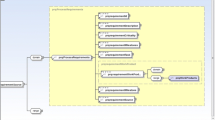Abstract
This article considers the creation of information support for process-based management of production systems on the basis of structural polymorphism. A review of polymorphism by types is presented and their strengths and weaknesses are given. Structural polymorphism is given a new definition that expands its capabilities. In the new proposed approach to creating information resources and software, structural polymorphism is used in the concept-based logical design of the system, as well as in the information support and software implementation phase.
Similar content being viewed by others
References
ARIS scripting tutorials. http://www.ariscommunity.com/users/eva-klein/2010-04-27-aris-scripting-tutorials. Accessed May 1, 2018.
Pierce, B.C., Types and Programming Languages, MIT Press, 2002.
Lammel, R. and Visser, J., Typed combinators for generic traversal, Practical Aspects of Declarative Languages: 4th International Symposium, 2002.
Booch, G., Object-Oriented Analysis and Design with Applications, Upper Saddle River, N.J.: Addison-Wesley, 2007, 3rd ed.
Strachey, C., Fundamental concepts in programming languages, Higher-Order Symb. Comput., 2000, vol. 13, nos. 1–2.
Garrigue, J., Simple type inference for structural polymorphism, The Ninth International Workshop on Foundations of Object-Oriented Languages, Portland, OR, 2002.
Garrigue, J., A certified implementation of ML with structural polymorphism, Proc. Asian Symposium on Programming Languages and Systems; Lect. Notes Comput. Sci., 2010, vol. 6461, pp. 360–375.
Litvinov, V., Constraint-bounded polymorphism: An expressive and practical type system for object-oriented languages, PhD Thesis, Washington: University of Washington, 2003.
Millstein, T., Modular typechecking for hierarchically extensible datatypes and functions, Proceedings of the Seventh ACM SIGPLAN International Conference on Functional Programming, Pittsburgh, PA, 2002, vol. 37, no. 9, pp. 110–122.
Neubauer, M., Functional logic overloading, Conference Record of the 29th Symposium on Principles of Programming Languages, Portland, OR, 2002, pp. 233–244.
Pottier, F., A versatile constraint-based type inference system, Nord. J. Comput., 2007 no. 4, pp. 312–347.
Tobin-Hochstadt, S., The design and implementation of typed scheme, Symposium on Principles of Programming Languages, San Francisco, CA, 2008, pp. 395–406.
Author information
Authors and Affiliations
Corresponding author
Additional information
Original Russian Text © V.N. Shvedenko, V.V. Shvedenko, O.V. Shchekochikhin, 2018, published in Nauchno-Tekhnicheskaya Informatsiya, Seriya 2: Informatsionnye Protsessy i Sistemy, 2018, No. 11, pp. 9–15.
About this article
Cite this article
Shvedenko, V.N., Shvedenko, V.V. & Shchekochikhin, O.V. Using Structural Polymorphism in Creating Process-Based Management Information Systems. Autom. Doc. Math. Linguist. 52, 290–296 (2018). https://doi.org/10.3103/S0005105518060031
Received:
Published:
Issue Date:
DOI: https://doi.org/10.3103/S0005105518060031




